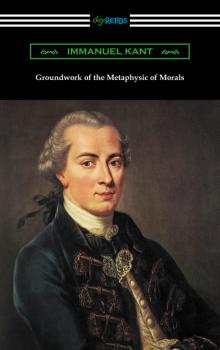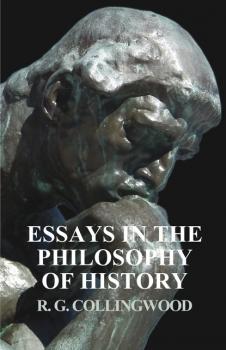ТОП просматриваемых книг сайта:
Философия
Различные книги в жанре Философия, доступные для чтения и скачиванияАннотация
The 18th century German philosopher Immanuel Kant is widely considered as one the most important figures in modern philosophy. His fundamental arguments with regard to the fields of metaphysics, epistemology, ethics, political philosophy, and aesthetics, have been highly influential and form the basis for much of contemporary thought upon the subjects with which he was concerned. Kant believed that there were fundamental concepts that structured human experience, and that reason principally should guide one’s examination of these concepts. “Groundwork for the Metaphysic of Morals” is his classic exposition of moral philosophy. In this work Kant examines the core concepts of moral theory in an effort to lay bare the fundamental principles of morality. This highly influential work of philosophy is groundbreaking in its argument that righteousness is a function of the character of the principles upon which people act. Kant’s ideas on morality are intriguing and exemplary of his deft at philosophical thought. “Groundwork for the Metaphysic of Morals” is a must read for all seeking a better understanding of the world and humanity’s place in it, through philosophical inquiry.
Аннотация
We live in a time of relentless change. The only thing that?s certain is that new challenges and opportunities will emerge that are virtually unimaginable today. How can we know which skills will be required to succeed?In Five Minds for the Future, bestselling author Howard Gardner shows how we will each need to master «five minds» that the fast-paced future will demand:· The disciplined mind, to learn at least one profession, as well as the major thinking (science, math, history, etc.) behind it· The synthesizing mind, to organize the massive amounts of information and communicate effectively to others· The creating mind, to revel in unasked questions – and uncover new phenomena and insightful apt answers· The respectful mind, to appreciate the differences between human beings – and understand and work with all persons· The ethical mind, to fulfill one's responsibilities as both a worker and a citizenWithout these «minds,» we risk being overwhelmed by information, unable to succeed in the workplace, and incapable of the judgment needed to thrive both personally and professionally.Complete with a substantial new introduction, Five Minds for the Future provides valuable tools for those looking ahead to the next generation of leaders – and for all of us striving to excel in a complex world.Howard Gardner—cited by Foreign Policy magazine as one of the one hundred most influential public intellectuals in the world, and a MacArthur Fellowship recipient—is the Hobbs Professor of Cognition and Education at the Harvard Graduate School of Education.
Аннотация
Published posthumously in 1965, this book contains various essays by R. G. Collingwood concerning history, philosophy, and their relationship. The essays mostly concern the idea of a 'philosophy of history', exploring its aims, limitations, and relevance. Highly recommended for students of philosophy and collectors of vintage literature of this ilk. Contents include: “Croce's Philosophy of History”, “Are History and Science Different Kinds of Knowledge?”, “The Nature and Aims of a Philosophy of History”, “Oswald Spengler and the Theory of Historical Cycles”, “The Limits of Historical Knowledge”, “A Philosophy of History”, “A Philosophy of Progress”, etc. Robin George Collingwood, FBA (1889 – 1943) was an English historian, philosopher, and archaeologist most famous for his philosophical works including “The Principles of Art” (1938) and the posthumously-published “The Idea of History” (1946). This fascinating volume will appeal to those with an interest in Collingwood's seminal work, and is not to be missed by students of philosophy and art. Many vintage books such as this are increasingly scarce and expensive. It is with this in mind that we are republishing this volume today in an affordable, modern edition complete with a specially-commissioned new biography of the author.
Аннотация
A third revival of the Twilight Zone series is being produced by Jordan Peele for CBS All Access.
Аннотация
Iron Man or Captain America? Which one is superior—as a hero, as a role model, or as a personification of American virtue? Philosophers who take different sides come together in <i>Iron Man versus Captain America</i> to debate these issues and arrive at a deeper understanding of the strengths and weaknesses of these iconic characters. The discussion ranges over politics, religion, ethics, psychology, and metaphysics.<br><br> John Altmann argues that Captain America’s thoughtful patriotism, is superior to Iron Man’s individualist-cosmopolitanism. Matthew William Brake also votes for Cap, maintaining that it’s his ability to believe in the impossible that makes him a hero, and in the end, he is vindicated.<br><br> Cole Bowman investigates the nature of friendship within the Avengers team, focusing predominantly on the political and social implications of each side of the Civil War as the Avengers are forced to choose between Stark and Rogers. According to Derrida’s <i>Politics of Friendship</i>, Cap is the better friend, but that doesn’t make him the winner!<br><br> Aron Ericson’s chapter tracks our heroes’ journeys in the movies, culminating with <i>Civil War</i>, where the original attitudes of Tony (trusts only himself) and Steve (trusts “the system”) are inverted.<br><br> Corey Horn’s chapter focuses on one of the many tensions between the sides of Iron Man and Captain America—the side of Security (Iron Man) versus Liberty (Cap). But Maxwell Henderson contends that if we dig deeper into the true heart of the Marvel Civil War, it isn’t really about security or privacy but more about utilitarianism—what’s best for everybody. Henderson explains why Iron Man was wrong about what was best for everybody and discloses what the philosopher Derek Parfit has to say about evaluating society from this perspective. Daniel Malloy explains that while both Captain America and Iron Man have faced setbacks, only Iron Man has failed at being a hero—and that makes him the better hero! In his other chapter, Malloy shows that where Iron Man trusts technology and systems, Captain America trusts people. Jacob Thomas May explores loss from the two heroes’ points of view and explains why the more tragic losses suffered by Stark clearly make him the better hero and the better person.<br><br> Louis Melancon unpacks how Captain America and Iron Man each embodies key facets of America attempts to wage wars: through attrition and the prophylactic of technology; neither satisfactorily resolves conflict and the cycle of violence continues. Clara Nisley tests Captain America and Iron Man’s moral obligations to the Avengers and their shared relationship, establishing Captain America’s associative obligations that do not extend to the arbitration and protection of humans that Iron Man advocates.<br><br> Fernando Pagnoni Berns considers that while Iron Man is too much attached to his time (and the thinking that comes with it), Captain America embraces-historical values, and thinks that there are such things as intrinsic human dignity and rights—an ethical imperative. Christophe Porot claims that the true difference between Captain America and Iron Man stems from the different ways they extend their minds. Cap extends his mind socially while Stark extends his through technology. Heidi Samuelson argues that the true American spirit isn't standing up to bullies, but comes out of the self-interested traditions of liberal capitalism, which is why billionaire, former-arms-industry-giant Tony Stark is ultimately a more appropriate American symbol than Steve Rogers. By contrast, Jeffrey Ewing shows that the core of <i>Captain America: Civil War</i> centers on the challenge superpowers impose on state sovereignty (and the monopoly of coercion it implies).<br><br> Nicol Smith finds that Cap and Shell-Head’s clash during the <i>Civil War</i> does not necessarily boil down to the issue of freedom vs. regulation but rather stems from the likelihood that both these iconic heroes are political and ideological wannabe supreme rules or “Leviathans.” Craig Van Pelt reconstructs a debate between Captain America and Iron Man about whether robots can ever have objective moral values, because human bias may influence the design and programming.<br><br> James Holt looks into the nature of God within Captain America’s world and how much this draws on the “previous life” of Captain Steve Rogers. Holt’s inquiry focuses on the God of Moses in the burning bush, as contrasted with David Hume’s understanding of religion. Gerald Browning examines our two heroes in a comparison with the Greek gods Hephaestus and Hercules. Christopher Ketcham supposes that, with the yellow bustard wreaking havoc on Earth, God asks Thomas Aquinas to use his logical process from <i>Summa Theologica</i> to figure which one of the two superheroes would be better at fixing an economic meltdown, and which one would be better at preventing a war.<br><br> Rob Luzecky and Charlene Elsby argue that gods cannot be heroes, and therefore that the god-like members of the Avengers (Iron Man, with a god’s intelligence; Thor, with a god’s strength, and the Hulk, with a god’s wrath) are not true heroes in the same sense as Captain America. Cap is like Albert Camus’s Sisyphus, heroic in the way that he rallies against abstract entities like the gods and the government.
Аннотация
Philosophers shine a light on the dark world of the hacker underground, corporate cybersecurity, and injustice in contemporary capitalist society as portrayed in the popular pessimistic techno-thriller, Mr. Robot.
Аннотация
Patocka's celebrated Introduction, here made available in English for the first time, is not an introduction in the ordinary sense of the term. Patocka ranges over the whole of Husserl's output, from The Philosophy of Arithmetic to The Crisis of the European Sciences , and traces the evolution of all the central issues of Husserlian phenomenology–intentionality, categorial intuition, temporality, the subject-body; the concrete a priori, and transcendental subjectivity. But rather than attempting to give a tour of Husserl's workshop, Patocka is himself hard at work on Husserl's problems.
Аннотация
Ethical questions lie at the very heart of all philosophy, and no one is better equipped to untangle the many facets of ethical theory than respected thinker and professor Jan Narveson. Drawing from theoretical notions as well as everyday applications, Narveson simplifies these nuanced ideas for any beginning ethicist. Discussing theoretical elements ranging from intuitionism to naturalism, emotivism to metaethics, Narveson’s approach to this complex topic is one that any reader will find accessible.
Аннотация
What, exactly, is human nature? What makes humans different from animals (if there is any difference)? In this book, Howard Kainz presents a philosophical analysis of the various concepts of human nature and the many controversies that have surrounded them for centuries. He explores issues such as whether human beings are truly free, whether human instincts differ from animal instincts, and the realities of human maturity.
Аннотация
Since he published The Myth of Mental Illness in 1961, professor of psychiatry Thomas Szasz has been the scourge of the psychiatric establishment. In dozens of books and articles, he has argued passionately and knowledgeably against compulsory commitment of the mentally ill, against the war on drugs, against the insanity defense in criminal trials, against the «diseasing» of voluntary humanpractices such as addiction and homosexual behavior, against the drugging of schoolchildren with Ritalin, and for the right to suicide. Most controversial of all has been his denial that «mental illness» is a literal disease, treatable by medical practitioners.In Szasz Under Fire, psychologists, psychiatrists, and other leading experts who disagree with Szasz on specific issues explain the reasons, with no holds barred, and Szasz replies cogently and pungently to each of them. Topics debated include the nature of mental illness, the right to suicide, the insanity defense, the use and abuse of drugs, and the responsibilities of psychiatrists and therapists. These exchanges are preceded by Szasz's autobiography and followed by a bibliography of his works.










